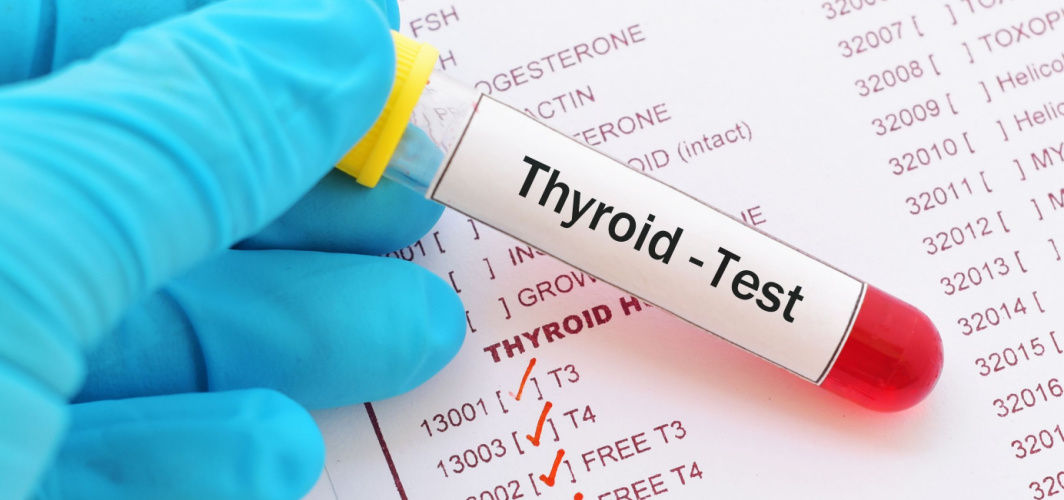General Health
Thyroid Tests: Process, Preparations, And Results
6 min read
By Apollo 24|7, Published on - 22 August 2023
Share this article
0
0 like

Thyroid health plays a vital role in various bodily functions, and thyroid disorders can have significant implications on an individual’s overall well-being. The hormones produced by the thyroid gland affect nearly every organ in your body and control many of your body's most important functions. Thyroid tests are essential diagnostic tools that provide valuable insights into thyroid function. In this blog, we will delve into the world of thyroid tests, including the types of tests available, when to consider getting tested, the preparations required, and how to interpret the results effectively.
What is a Thyroid Test?
A thyroid test is a fundamental medical examination that involves measuring the levels of thyroid hormones and other relevant markers in the bloodstream. These tests provide valuable insights into the functioning of the thyroid gland and help detect any abnormalities or imbalances in hormone production. The thyroid gland, situated in the front of the neck, plays a crucial role in regulating metabolism, growth, and development throughout the body.
Thyroid tests typically assess the levels of hormones such as
- thyroid-stimulating hormone (TSH)
- thyroxine (T4)
- triiodothyronine (T3)
TSH, produced by the pituitary gland, stimulates the thyroid gland to produce T4 and T3. Imbalances in these hormones can indicate various thyroid conditions, including hypothyroidism (underactive thyroid) or hyperthyroidism (overactive thyroid). In addition to hormone levels, other markers such as thyroid antibodies may be measured to detect autoimmune thyroid diseases.
By analyzing the results of thyroid tests at home, healthcare professionals can evaluate thyroid function, diagnose thyroid disorders, and determine appropriate treatment strategies.
Types of Thyroid Tests
1. Thyroid Stimulating Hormone (TSH) Test
The TSH test is commonly used to assess thyroid function. Elevated TSH levels may indicate an underactive thyroid (hypothyroidism), as the body is trying to stimulate the thyroid to produce more hormones. Conversely, low TSH levels may suggest an overactive thyroid (hyperthyroidism), as the body is trying to reduce stimulation to the thyroid.
2. Thyroid Hormone Tests
Thyroid hormone tests measure the levels of thyroxine (T4) and triiodothyronine (T3) in the bloodstream. The primary hormone manufactured by the thyroid gland is T4, whereas T3 is the more biologically potent variant. Abnormalities in these hormone levels indicate thyroid dysfunction. Low levels of T4 and T3 suggest hypothyroidism, while elevated levels indicate hyperthyroidism.
3. Thyroid Antibody Tests
Thyroid antibody tests are used to detect the presence of antibodies that target the thyroid gland. These antibodies can attack and damage the thyroid, leading to autoimmune thyroid conditions such as Hashimoto's thyroiditis or Graves' disease. Detecting these antibodies helps in the diagnosis and management of autoimmune thyroid disorders.
When to Get a Thyroid Test?
Thyroid tests may be recommended in various situations based on specific symptoms faced. The presence of symptoms such as
- Fatigue
- Weight changes
- Hair loss
- Depression
- Temperature sensitivity
- Mood swings
- Genetics
Individuals with known thyroid conditions or those receiving thyroid hormone replacement therapy require periodic testing. This helps assess treatment effectiveness and adjust medication dosage if necessary. During pregnancy or fertility-related concerns, evaluating thyroid health is crucial as thyroid dysfunction can impact fertility, pregnancy outcomes, and the overall health of both the mother and baby. Proper assessment through thyroid tests ensures timely diagnosis, appropriate management, and optimal thyroid health.
Preparation for Thyroid Test
Consulting with your healthcare provider is essential when it comes to medications and supplements that may interfere with thyroid tests at home. Certain medications, such as thyroid hormone replacement therapy or medications containing iodine, can affect thyroid test results.
Preparing for a thyroid test involves several steps to ensure accurate results:
- Fasting: Some thyroid tests require fasting for a certain period before the test, typically overnight. Check with your healthcare provider if fasting is necessary for your specific test.
- Medication Adjustments: If you're taking thyroid medications, your doctor may advise you to adjust the timing or dosage before the test. Follow their instructions carefully.
- Avoiding Supplements: Certain supplements and medications can interfere with thyroid test results. Inform your doctor about all the medications and supplements you're taking.
By adhering to the guidance of your healthcare provider regarding medications, supplements, and any necessary fasting instructions, you can ensure accurate and reliable thyroid test results.
Understanding Thyroid Test Results
Thyroid test results typically include measurements of thyroid-stimulating hormone (TSH), thyroxine (T4), triiodothyronine (T3), and thyroid antibodies. It is important to note that normal ranges for these markers can vary slightly depending on the specific laboratory and individual factors, such as age and overall health.
Understanding thyroid test results involves interpreting the levels of thyroid hormones and thyroid-stimulating hormone (TSH) in your blood:
- TSH Level: A high TSH level usually suggests an underactive thyroid (hypothyroidism), while a low TSH level may indicate an overactive thyroid (hyperthyroidism).
- T3 and T4 Levels: Elevated levels of T3 and T4 may indicate hyperthyroidism, whereas low levels could point to hypothyroidism.
- Thyroid Antibodies: The presence of certain antibodies indicates autoimmune thyroid disorders like Hashimoto's thyroiditis or Graves' disease.
- Thyroglobulin Test: Used to monitor thyroid cancer, high levels might suggest recurrence or spread.
- Calcitonin Test: Measures calcitonin hormone levels to detect and monitor medullary thyroid cancer.
Additional assessments, such as imaging tests like ultrasound or scintigraphy may be required to determine the underlying cause of the abnormal results and to develop an appropriate treatment plan. This comprehensive approach ensures that individuals receive accurate diagnoses and tailored treatment strategies to manage their thyroid health effectively.
Conclusion
Thyroid tests are valuable tools for assessing thyroid function and identifying potential thyroid disorders. By proper and informed understanding of the symptoms, and the tests required, individuals can proactively manage their thyroid health and seek appropriate treatment when necessary.
To check your thyroid hormone levels,
FAQs
Q. How often should thyroid tests be done?
The frequency of thyroid tests depends on individual factors, such as age, symptoms, and existing thyroid conditions. Your healthcare provider will determine the appropriate testing schedule based on your specific needs.
Q. Can thyroid tests diagnose all thyroid disorders?
While thyroid tests provide valuable information about thyroid function, they may not detect all types of thyroid disorders. Additional tests and evaluations may be necessary for a comprehensive diagnosis.
Q. Can medications affect thyroid test results?
Certain medications and supplements can interfere with thyroid test results. It is crucial to inform your healthcare provider about any medications or supplements you are taking before undergoing thyroid testing.
Q. Can thyroid tests detect all types of thyroid disorders?
Thyroid tests provide valuable information about thyroid function and can detect various thyroid disorders. However, it is important to note that certain conditions, such as thyroid nodules or thyroid cancer, may require additional tests, such as ultrasound or fine-needle aspiration, for accurate diagnosis.
General Health
Consult Top Endocrinologists
View AllLeave Comment
Recommended for you

General Health
Dolo 650: Potential Interactions And Precautions
Discover essential information about Dolo 650, including its potential interactions and precautions, for safe and effective usage.

General Health
Seaweed To Shrimps, 5 Iodine-Rich Foods For People With Hypothyroidism
Those suffering from hypothyroidism have an underactive thyroid gland that doesn’t produce a sufficient amount of thyroid hormones. Increasing your intake of iodine can help boost the production of thyroid hormones to help manage this condition. Read on to find out which foods are high in iodine.

General Health
Top 10 Calcium-Rich Foods: Building Strong Bones and Teeth
Strengthen your bones and teeth with these top 10 calcium-rich foods. Discover a foundation of natural vitality and well-being.
Subscribe
Sign up for our free Health Library Daily Newsletter
Get doctor-approved health tips, news, and more.
Visual Stories

Plant-based Foods That Are a Great Source of Iron
Tap to continue exploring
Recommended for you

General Health
Dolo 650: Potential Interactions And Precautions
Discover essential information about Dolo 650, including its potential interactions and precautions, for safe and effective usage.

General Health
Seaweed To Shrimps, 5 Iodine-Rich Foods For People With Hypothyroidism
Those suffering from hypothyroidism have an underactive thyroid gland that doesn’t produce a sufficient amount of thyroid hormones. Increasing your intake of iodine can help boost the production of thyroid hormones to help manage this condition. Read on to find out which foods are high in iodine.

General Health
Top 10 Calcium-Rich Foods: Building Strong Bones and Teeth
Strengthen your bones and teeth with these top 10 calcium-rich foods. Discover a foundation of natural vitality and well-being.